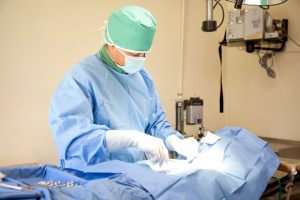 We are asked a lot of questions. So, here is what you need to know before your pet’s upcoming surgery.
We are asked a lot of questions. So, here is what you need to know before your pet’s upcoming surgery.
Is the Anesthetic Safe?
Today’s modern anesthetic monitors have made surgery much safer than in the past. We do a thorough physical exam on your pet before administering anesthetics, to ensure that a fever or other illness won’t be a problem. We also adjust the amount and type of anesthetic used depending on the health of your pet. Preanesthetic blood testing is important in reducing the risk of anesthesia. Every pet needs blood testing before surgery to ensure that the liver and kidneys can handle the anesthetic. Even healthy animals can have serious organ system problems that cannot be detected without blood testing. If there is a problem, it is much better to find it before it causes anesthetic or surgical complications. If serious problems are detected, surgery can be postponed until the problem is corrected. We offer pre-anesthetic blood testing for a separate charge which is not included in the fee for service charge for surgical procedures. It is important that surgery is performed on a pet’s empty stomach to reduce the risk of vomiting during and after anesthesia. You will need to withhold food and water from your pet after 10pm the day before surgery.
Will my pet have stitches?
For many surgeries, we use absorbable sutures underneath the skin. These will dissolve on their own, and do not need to be removed later. Some surgeries, especially tumor removals, do require skin stitches. With either type of suture, you will need to keep an eye on the incision for swelling or discharge. Most dogs and cats do not lick excessively or chew at the surgery site incision. However, if you notice your pet is licking/chewing at his/her surgery site excessively, please take notice and call our office. If there are skin sutures, these will usually be removed by the doctor in our office in 10 to 14 days after surgery. You will also need to limit your pet’s activity level for a specified time as directed by the doctor and no baths are allowed for the first 10 days after surgery.
What other decisions do I need to make?
While your pet is under anesthesia, it is the ideal time to perform other minor procedures, such as dentistry, ear cleaning, or implanting an identification microchip. If you would like an estimate for these extra services, please call ahead of time. This is especially important if the person dropping the pet off for surgery is not the primary decision maker for the pet’s care.When you bring your pet into the office for surgery, we will need 5 to 10 minutes of your time to fill out paperwork, make decisions on the pre-anesthetic blood testing, and discuss the other options available to your pet during surgery as mentioned above. When you pick up your pet after surgery, please plan to spend about 10 minutes to discuss your pet’s home care needs. We will call you the night before your scheduled surgery appointment to confirm the time you will be dropping your pet off and to answer any questions you may have. In the meantime, please do not hesitate to call us with any questions about your pet’s health or surgery.
